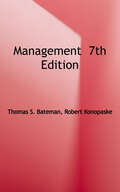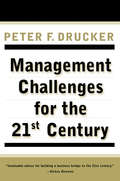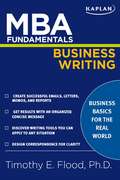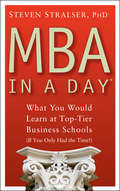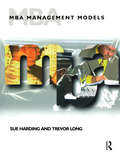- Table View
- List View
M: 2024 Release
by Michael Weigold and William ArensM: Advertising examines advertising from the perspective of the advertiser as well as the specialists who create advertising. M: Advertising takes students beyond theory to learn about roles within each of these organizations, and to consider which they might one day play themselves in a highly visual, condensed, engaging format. Supported by a robust digital through McGraw Hill Connect, M: Advertising is relevant and engaging for today’s business students.
M: Advertising
by Michael F. Weigold William ArensM: Advertising is the newest principles addition to the McGraw-Hill M series of texts, and was created with students' and professors' needs in mind. It explores the core principles that drive advertising, using a lively voice that goes beyond academic theory. The authors' goal was to present advertising as it is actually practiced and make the fundamentals accessible and relevant to the student's “real life.” This approach truly transcends the conceptual and propels students into an exciting and practical dimension. <P><P>Students receive a cost-effective, easy to read, focused text complete with study resources (both print and online) to help them review for tests and apply chapter concepts. <P><P>Professors receive a text that contains all the pertinent information – yet in a more condensed format that is easier to cover by students. Connect assignments are provided to utilise the power of the web, making projects more fun for students and automatically grade materials to support instructors. M: Advertising also includes unmatched teaching support.
M: Business
by Linda Ferrell O. C. Ferrell Geoffrey HirtWith obstacles put in place to question a potential leader's ethics, world view and career outlook, how does a future leader rise to the top while overcoming obstacles? M: Business brings clarity to what business is about. Its design provides a cutting edge approach to business, and its technology components offer an active learning environment, allowing students to envision a prosperous career in business.
M: Business, 3rd Edition
by Linda Ferrell O. C. Ferrell Geoffrey HirtWe hear over and over again that the modern learner has a completely new and different set of needs from a learning package. These new 'digital natives' have developed cognitive thinking patterns that are different from those of earlier generations of students. It's important that educators recognize these differences in students, and that they also account for students with differing learning styles. Students today rely on technology as an important tool in their educational and personal lives. M: BUSINESS accounts for these differences in students today and appeals more effectively to digital natives. An emphasis is placed on the visual and technology component of the product offering (Connect®), while the text remains a (important) supporting tool for their learning in the course. Students today are used to active learning experiences, which is what M: Business provides. The book in combination with the personal study partner (LearnSmart), and the Interactive Applications in Connect Business provide students with a rich, interactive experience that enhances the text content, and keeps them actively engaged in the course content. Students today are also used to feedback and 'payoff'-Connect Business provides these interactive rewards for learning the course content.
M: Management
by Thomas S. Bateman Robert KonopaskeM: Management, 7th Edition is designed for today's student who craves accelerated learning: reader-friendly, highly visual, and digestible. This affordable magazine format captures student's attention with real-world examples of familiar companies, inspiring green initiatives, and career-oriented tips to help students progress in their careers. <p><p>Connect ® provides a wide variety of auto-graded learning resources that enhance your students' higher-order thinking and workplace competency skills. The 7th edition continues to evolve, featuring news-making business leaders and compelling company examples through which students learn how to apply management concepts and best practices.
M: Management (4th Edition)
by Thomas S. Bateman Scott A. Snell Robert KonopaskeM: Management by Bateman/Snell is the fastest growing Principles of Management textbook on the market. Bateman/Snell is written from the ground up to be brief, lean, and flexible enough to enable you to cover just the topics you want at the level of depth you want, while still maintaining the integrity of the content. Plus, it does not inherit outdated examples from a hardback derivative. With market-leading teaching support and the most up to date content available, M: Management represents the best value available in the brief Principles of Management market. What sets Bateman/Snell apart? An unrivaled mixture student-focused current content and the best teaching support around.
M: Marketing
by Dhruv Grewal Michael LevyM: Marketing is the most concise, impactful approach to Principles of Marketing on the market, with tightly integrated topics that explore both marketing fundamentals and new influencers, all in an engaging format that allows for easy classroom and assignment management. A robust suite of instructor resources and regularly updated Grewal/Levy author blog provide a steady stream of current, fresh ideas for the classroom.
M: Marketing
by Dhruv Grewal Michael LevyM: Marketing is the most concise, impactful approach to Principles of Marketing on the market, with tightly integrated topics that explore both marketing fundamentals and new influencers, all in an engaging format. Authors Grewal and Levy emphasize that even the best products and services will go unsold if marketers cannot communicate their value. A robust suite of instructor resources and a regularly updated author blog provide a steady stream of current, fresh ideas for the classroom. Grewal and Levy's M: Marketing, Sixth Edition, is available through McGraw-Hill Connect®, a highly reliable, easy-to-use homework and learning management solution that embeds learning science and award-winning adaptive tools to improve student results.
MANAGEMENT CHALLENGES for the 21st Century
by Peter F. DruckerPeter F. Drucker discusses how the new paradigms of management have changed and will continue to change our basic assumptions about the practices and principles of management. Forward-looking and forward-thinking, Management Challenges for the 21st Century combines the broad knowledge, wide practical experience, profound insight, sharp analysis, and enlightened common sense that are the essence of Drucker's writings and "landmarks of the managerial profession." --Harvard Business Review
MANUAL JURÍDICO DE AUTOEDICIÓN
by Helen Sedwick Juliana S. ArangoDescripción del libro: El Manual Jurídico de Autoedición es la primera guía paso a paso sobre cuestiones jurídicas referentes a la Autoedición. La abogada y autora auto-editada, Helen Sedwick, se vale de sus 30 años de experiencia para mostrarles a sus lectores y autoeditores cómo mantenerse tranquilos en sus escritorios, y alejados de problemas legales. Los temas incluyen: * Creación de negocio. Desde la forma de establecer el nombre de la compañía (de la sigla en inglés DBAs para 'hacer negocio como'), pasando por los impuestos a las ventas, hasta la financiación colectiva o mecenazgo, el Manual Jurídico de Autoedición acompaña a los autores a lo largo del proceso de creación de sus emprendimientos. * Pasar del Manuscrito al Libro. El Manual Jurídico de Autoedición compara las opciones que se tienen al involucrarse con una compañía de servicios de autoedición o auto-publicación, o al trabajar por cuenta propia usando un proveedor de impresión bajo demanda. También realiza un listado de las disposiciones contractuales que son aceptables y las que no lo son. Explica los mecanismos de contratación de diseñadores, editores y otros freelancers o trabajadores independientes. * Cuestiones de Propiedad Intelectual. Elementos como copyrights o derechos de autor, marca registrada, uso razonable y dominio público son explicados en términos prácticos y útiles, incluyendo información relevante sobre cómo localizar titulares de derechos de autor y cómo pedir su autorización. El Manual Jurídico de Autoedición ofrece también algunas recomendaciones sobre la obtención de licencias para el uso de imágenes y música por poco dinero o de manera gratuita. * Regulaciones de Internet. Cualquier bloguero tiene que saber sobre políticas de privacidad, spam o comunicaciones no deseadas, sobre el Acta de Protección de la Privacidad de los Niños en Línea (COPPA) y sobre el Acta de Derechos de Autor Digital del Milenio
MARS Applications in Geotechnical Engineering Systems: Multi-Dimension with Big Data
by Wengang ZhangThis book presents the application of a comparatively simple nonparametric regression algorithm, known as the multivariate adaptive regression splines (MARS) surrogate model, which can be used to approximate the relationship between the inputs and outputs, and express that relationship mathematically. The book first describes the MARS algorithm, then highlights a number of geotechnical applications with multivariate big data sets to explore the approach’s generalization capabilities and accuracy. As such, it offers a valuable resource for all geotechnical researchers, engineers, and general readers interested in big data analysis.
MAYA Capital
by Robert F. White Carla Larangeira Pedro LevindoMAYA Capital co-founders Lara Lemann and Monica Saggioro raised $41.5 million through a series of closings for their early-stage Latin American venture capital fund. The two women had met for the first time in mid-2016 when Lemann was contemplating scaling her angel investing experience by structuring a fund, and Saggioro was about to start her MBA program at Harvard Business School. After founding MAYA in 2018, the pair built an investment portfolio in sector-agnostic investments across the region, providing startup founders with an on-demand, hands-on management support approach. MAYA also initiated a series of creative efforts to help develop its venture ecosystem and to source opportunities. By 2021, Lemann and Saggioro had invested approximately $21 million in 28 companies, with several completing subsequent follow-on rounds of financing to support their growth. By then, Latin America s VC market size had more than doubled since MAYA s inception, with escalating competition among local players. Lemann and Saggioro faced several important decisions: When should they raise another fund? How large should the next fund be? Should they alter their investment strategy? And as MAYA expanded its portfolio, would they be able to sustain their hands-on management support strategy?
MBA Em Uma Semana Como Fazer Um Curso On-line Da Ivy League Por Pouco Ou Sem Custo
by James AbbottAté agora, o que muitos sabem é que os programas de MBA são caríssimos e oferecem pouco benefício em comparação ao preço alto que se paga. O que pode ser um desperdício não só de dinheiro, mas também do tempo enorme que é necessário investir. Se você está em busca de um diploma de MBA, mas não quer pagar um valor absurdo para obtê-lo? Se o que você quer é ganhar tempo, obtendo um "MBA da vida real" em menos de uma semana? Se você está procurando um "MBA da vida real" no conforto da sua própria casa, sem sair do seu sofá? Então este livro é para você. Alguns dos tópicos abordados são: - Mini programas de MBA - Cursos on-line - Os melhores programas - Como registrar - Como começar - Cursos gratuitos - Como se preparar para o sucesso -> Role até o topo da página e clique em adicionar ao carrinho para comprar automaticamente Aviso Legal: Este autor e detentor de direitos não fazem reivindicações, promessas ou garantias sobre a exatidão, integridade ou aplicação do conteúdo deste livro, e se isenta expressamente da responsabilidade por erros e omissões nos conteúdos nele contidos. Este produto é apenas para referência. Gênero: NEGÓCIOS E ECONOMIA Gênero Secundário: EDUCAÇÃO / Métodos de Ensino & Materiais / Geral Língua: Português Brasil Contagem de palavra: 6.526 (português) Links de livros: Amazon
MBA Fundamentals Business Writing
by Timothy E. FloodNeed to summarize a meeting for your boss? Send an email that alerts the recipient to a change in plans? Formally respond to a customer's query? The way you word, format, and transmit business correspondence directly affects the results you'll get. This handy guide provides thorough, straightforward guidance on the writing issues you frequently encounter. You'll learn all of the business writing basics, including: How to organize your writing for maximum efficiency Essential guidelines for enacting a professional tone and presence Helpful strategies for ensuring proper use of punctuation and grammar Practical techniques for the layout of your text and embedded visual objects Best practices for print and electronic communications, including memos, letters, reports, and emails
MBA In A Day
by Steven StralserThe same critical information top business schools teachBased on Professor Stralser's popular seminar series, MBA in a Day? is specifically designed for the busy professional (physician, attorney, architect, nonprofit executive, etc.) or entrepreneur/small business owner, who needs to know about the "business-side" of their practice, organization or business. With comprehensive coverage of vital business topics, important concepts and proven strategies taught at top graduate schools, this handy book offers a complete business education without the hassle of enrolling in an MBA program. Divided into four sections covering management and policy; economics, finance, and accounting; marketing; and systems and processes; this straightforward guide is easy to navigate and simple to use. Packed with illustrative examples, helpful anecdotes, and real-world case studies, this commonsense guide covers everything busy professionals would learn at the very best business schools-if they only had the time.Steven Stralser, PhD (Phoenix, AZ), is Clinical Professor and Managing Director, The Global Entrepreneurship Center at Thunderbird: The American Graduate School of International Management and founder and CEO of The Center for Professional Development, Inc., an organization dedicated to post-graduate training and education of today's professionals.
MBA In A Week: All The Insights Of A Master Of Business Administration Degree In Seven Simple Steps
by Alan FinnBusiness brilliance just got easierThis very practical 'seven-day MBA' does not assume prior knowledge and distils the most practical business insights from MBA studies into easy-to-digest bite-sized chunks. Ambitious people on the corporate ladder see achieving an MBA as a way to get ahead and to demonstrate their ambition - in short, to rise head and shoulders above the ranks of the other junior managers in their organizations. Creating visions for growth and spearheading their implementation gets you noticed by top management looking for vigorous new blood to lead the organizations of the future. But it is difficult to create all-embracing, organization-wide visions for growth if you don't really understand how the other departments - departments other than yours - work together.Studies for an MBA degree don't set you apart just because you have a certificate on your office wall. Knowledge of other departments' aims and objectives, and the workplace challenges their managers face, gives you an inside track on how to improve the overall efficiency of the organization - while making sure that your work gets the credit it deserves! The abilities you will develop will gain the respect of your peers, and your own department's increased efficiency will be noticed by senior management.This seven-day 'MBA In A Week' raises your game - ambitious managers can learn in a week what the experts learn in a lifetime. You will learn how to integrate the objectives and operations of the whole enterprise into new formations that will deliver sustainable growth and increased shareholder value - as well as impress your boss or a potential new employer at interview! Over this week-long course you will cover:- Sunday: Global business pressures and change- Monday: Finance, economics and accounting- Tuesday: Entrepreneurship, ethics and social responsibility- Wednesday: Strategy and marketing- Thursday: Operations management - Friday: Organizational behaviour and human resources management- Saturday: Research and change management
MBA In A Week: All The Insights Of A Master Of Business Administration Degree In Seven Simple Steps
by Alan FinnMBA In A Week is a simple and straightforward way to get the edge in business, giving you everything you really need to know in just seven short chapters. Every day it focuses on one area of MBA study, from global business, finance and accounting, to strategy, marketing and operations management.This book distils the most practical business insights of an MBA into easy-to-digest bite-sized chunks, giving you a basic knowledge and understanding of the key concepts, together with practical and thought-provoking exercises. Whether you choose to read it in a week or in a single sitting, MBA In A Week is your fastest route to success:- Sunday: Global business pressures and change- Monday: Finance, economics and accounting- Tuesday: Entrepreneurship, ethics and social responsibility- Wednesday: Strategy and marketing- Thursday: Operations management - Friday: Organizational behaviour and human resources management- Saturday: Research and change managementABOUT THE SERIESIn A Week books are for managers, leaders, and business executives who want to succeed at work. From negotiating and content marketing to finance and social media, the In A Week series covers the business topics that really matter and that will help you make a difference today. Written in straightforward English, each book is structured as a seven-day course so that with just a little work each day, you will quickly master the subject. In a fast-changing world, this series enables readers not just to get up to speed, but to get ahead.
MBA In Jeopardy (A)
by Lynn Sharp PaineThe Community Standards Panel of Harvard Business School must determine whether two students have violated the school's community standards, and if so, what sanction would be appropriate. Concerns allegations of plagiarism. In a second-year elective course, two students submitted a joint paper, substantial portions of which were taken nearly verbatim from their sources. The material was not footnoted. However, the sources were listed in the bibliography provided at the end of the paper. The students, who are not from the United States, claim that they followed the citation practices customary in their home country.
MBA In Jeopardy (A)
by Lynn Sharp PaineThe Community Standards Panel of Harvard Business School must determine whether two students have violated the school's community standards, and if so, what sanction would be appropriate. Concerns allegations of plagiarism. In a second-year elective course, two students submitted a joint paper, substantial portions of which were taken nearly verbatim from their sources. The material was not footnoted. However, the sources were listed in the bibliography provided at the end of the paper. The students, who are not from the United States, claim that they followed the citation practices customary in their home country.
MBA Internet: Como começar um negócio de software (sem escrever nenhum código)
by Tom HuntAntes, a capacidade de criar uma empresa de software era restrita a programadores com acesso a capital de risco, mas agora a tecnologia está avançando… as barreiras de entrada caíram o suficiente para o empreendedor ambicioso tirar proveito de serviços compartilhados e um "pool" global de talentos. Você pode estar preso a uma carreira corporativa sem alma, à procura de um novo modelo de negócio inovador e lucrativo na Internet ou pode ser que deseje lançar seu negócio startup. Você precisa de um passo a passo, um processo comprovado que irá guiá-lo através da selva traiçoeira que é a Internet em 2017. Existem poucos modelos de negócios que oferecem lucratividade e diferenciação na mesma medida que um negócio de SaaS (Software como serviço). E sabe qual é a melhor parte? Quando seu sistema de geração de valor está operando de forma eficaz ... este sistema é extremamente valioso para potenciais comprador, já que você, o dono, não está diretamente envolvido com o processo de criação de valor. E quem melhor para ensinar do que alguém que tenha cometido TODOS os erros antes? Depois de estudar Química no Imperial College London Tom foi trabalhar para a Big 4 Accounting Company E&Y e para a empresa global de consultoria de gestão Accenture. O único problema era ... ele não tava nem aí para esse trabalho. Após 2 anos no mundo corporativo, as coisas tiveram que mudar… E mudaram, quando ele vendeu seu primeiro par de leggings masculinas para alguém que não conhecia através da Internet em 2013 (descubra como no livro;)). Tom passou então os próximos 4 anos investindo tempo na construção de empresas na Internet. Essa jornada levou Tom a falar em um evento do TEDx sobre fracasso, lançar seu negócio de leggings masculinas no Dragons' e viajar pelo mundo, enquanto construía, escalava e vendia negócios na Internet. Você vai ap
MBA Management Models
by Sue HardingIf you�re a student on an MBA or management course, you�ll be expected to demonstrate a knowledge of a range of models. This textbook collects together the 45 models most likely to be required, summarized in a standard format. Each entry contains a diagram of the model; the principles on which it�s based; underlying assumptions; guidance on application, and relevant issues; related models; and sources of further reference. Models are organized by subject area: accounting; business strategy; human resources; organizational strategy; and strategic marketing. An alphabetical matrix index means you can find the right model quickly. MBA Management Models will be invaluable to students working on written assignments, projects, case studies or dissertations, and to practising managers too.
MBA On The Go: 30 Minute Reads
by Nicholas BateNeither the time nor money to study for an MBA? Skill-up with this 30 minute read! Make the most of your commute to work by discovering the critical models and hard-won wisdom of an MBA course in short form. MBA On The Go is an ultra-condensed, mobile guide to the essential thinking which will make your business fitter and stronger – quickly. MBA On the Go: • Can be read in 30 minutes – that's the same as the average commute time • Covers core business skills and problems to make your work life more productive and more successful • Provides the answer to pretty well any business challenge you might have • Is written in an engaging and punchy style with high impact
MBA Personal
by Josh KaufmanCasi todo el mundo está de acuerdo: los MBA son una pérdida de tiempo y de dinero. Al cabo de dos años, los recién graduados pasan a engrosar el ejército de mandos intermedios y empiezan a descubrir cómo de verdad funcionan las empresas. Kaufman ha creado su propio negocio que se basa en condensar los principios fundamentales del management para hacerlos fácilmente accesibles para cualquier profesional. Comparte con sus lectores los conceptos esenciales acerca de las ventas, el marketing, la negociación, la estrategia y otras áreas de la gestión. Con este libro el lector podrá aprender los conceptos que la mayoría de los profesionales emplean toda una vida en dominar.
MBA Personal: Lo que se aprende en un MBA por el precio de un libro
by Josh KaufmanTodo lo que necesita saber para dominar el arte del management, de una manera accesible y práctica. Josh Kaufman demuestra que, para triunfar, no es necesario pagar el dineral que vale un MBA. Muchas escuelas de negocios se limitan a ofrecer una educación desfasada como si fueran cadenas de montaje. Al cabo de dos años, los recién graduados pasan a engrosar el ejército de mandos intermedios y empiezan a descubrir cómo funcionan de verdad las empresas. Josh Kaufman ha creado su propio negocio, que se basa en condensar los principios básicos del management y hacerlos fácilmente accesibles para todo tipo de profesionales, sea cual sea su nivel de responsabilidad o el sector en que trabajan. En MBA personal comparte con sus lectores los conceptos esenciales en todas las áreas de la gestión empresarial. Los auténticos líderes no solo se forman en las escuelas de negocios: se hacen a sí mismos, van mejorando su preparación y adquieren la experiencia necesaria para triunfar. Con este libro el lector podrá aprender unos conocimientos que la mayoría de los profesionales emplean toda una vida en dominar. Los expertos opinan...«He conocido muy pocas personas como Kaufman que dominen completamente los secretos de la eficacia.»David Allen, autor de Organízate con eficacia «Después de leer este libro nadie podrá decirle que no es lo suficientemente listo, perspicaz o no está bien preparado para lograr un puesto de responsabilidad. Josh hace un repaso de todos los conceptos clave en el management.»Seth Godin, autor de La vaca púrpura «No haga caso, un MBA no es imprescindible. Si además de leer este libro aplica sus conceptos logrará dar un salto en su carrera.»Kevin Kelly, fundador y editor ejecutivo de Wired





